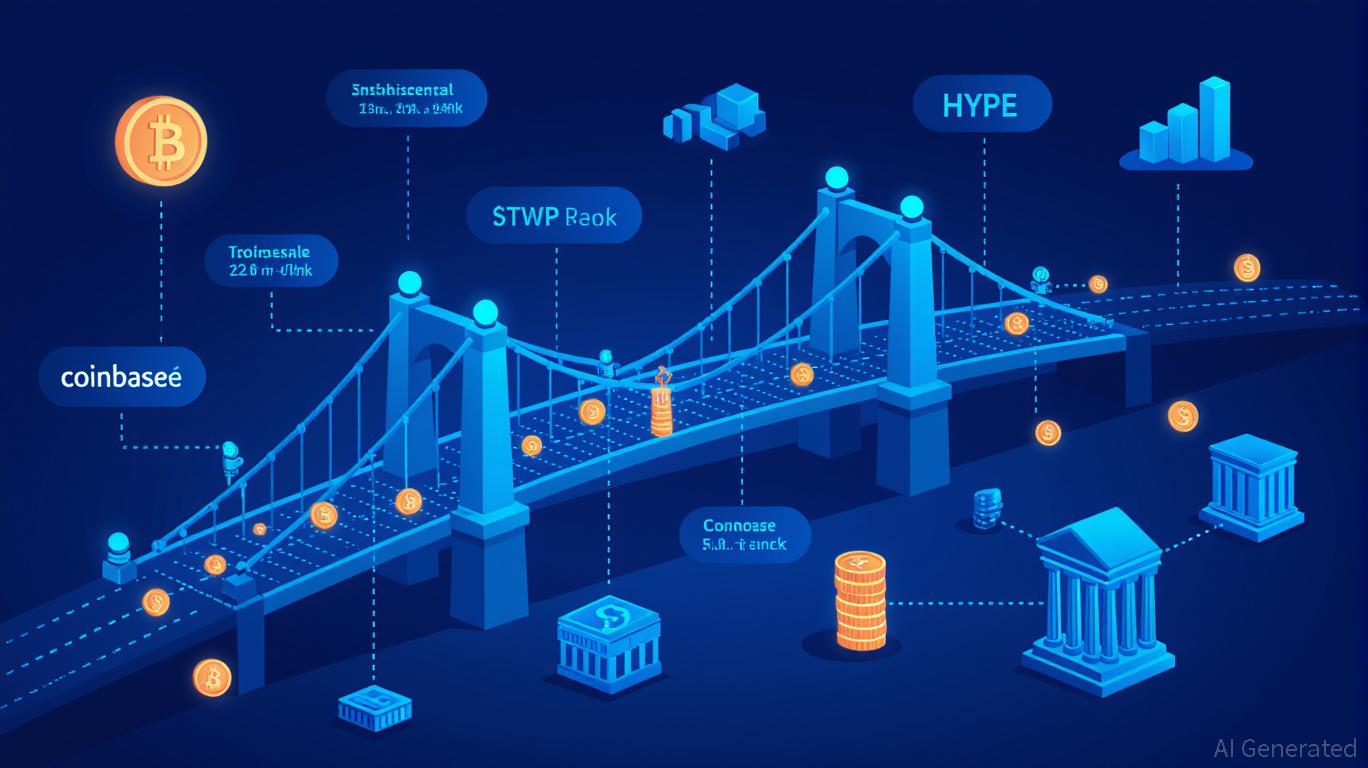Hyperliquid's Growing Influence in Crypto Trading: The Impact of Institutional Engagement on DeFi Evolution
- Hyperliquid drives DeFi mainstream adoption via institutional partnerships and a $2.15B TVL, including a HYPE token ETF application by 21Shares. - Regulatory compliance through zk-KYC and smart contract audits aligns with SEC/CFTC frameworks, accelerating institutional trust in DeFi protocols. - Zero-gas fee Layer 1 blockchain and $3T+ trading volumes position Hyperliquid as a scalable bridge between decentralized infrastructure and institutional capital. - Leadership transitions and 160% vault APYs high
Institutional Partnerships and ETF Applications: Opening Doors to Mass Adoption
Hyperliquid’s partnership with DeFi protocol Felix, formalized via a HYPE Asset Use Service (HAUS) agreement, highlights its growing reach. By providing Felix with 500,000 HYPE tokens, Hyperliquid has facilitated the launch of a perpetual futures market on its HIP-3 protocol, creating additional income streams for holders of staked HYPE assets
Interest from institutions has grown further with 21Shares filing an S-1 registration with the U.S. Securities and Exchange Commission (SEC) for a Hyperliquid ETF. Managed by Coinbase Custody and BitGo Trust, this ETF is designed to offer exposure to HYPE tokens without requiring direct token ownership, reflecting the rising appetite for crypto-based ETFs

Navigating Regulatory Compliance: Building Institutional Confidence
The regulatory landscape for DeFi in 2025 is clearer than ever before. With the SEC prioritizing investor safeguards and the CFTC overseeing derivatives, DeFi platforms must operate within a dual regulatory structure. Hyperliquid’s approach to compliance—focusing on transparent smart contracts, thorough governance token audits, and privacy-centric KYC/AML protocols—
The SEC’s recent endorsement of universal listing rules for spot crypto ETFs has also shortened the approval process,
Market Impact and Technical Advantages: Meeting Institutional Needs at Scale
Hyperliquid’s on-chain perpetual exchange, which operates on a proprietary Layer 1 blockchain, delivers zero gas fees and remarkable scalability. With trading volumes surpassing $3 trillion and open interest reaching $7.2 billion, the platform
The platform’s technological strengths are further highlighted by its dominance in the DeFi perpetual futures market, which is nearing $1 trillion in monthly trading activity. As noted in a Bitget report, Hyperliquid’s removal of gas fees and nearly instant settlement
Systemic Changes and Future Prospects
Hyperliquid’s impact goes beyond its own statistics. Strategic moves like the HAUS partnership with Felix are expanding decentralized trading and boosting TVL. However, recent executive changes—including CEO Michael Rowe’s departure and Hyunsu Jung stepping in as interim leader—have brought some uncertainty ahead of the Q3 2025 earnings report
Despite these headwinds, optimism remains high. Hyperliquid’s vault APYs have soared to 160%, and the Open Interest-Weighted Funding Rate has risen to 0.0085%,
Conclusion
The surge of institutional interest in Hyperliquid represents more than a passing phase; it marks a fundamental transformation in DeFi trading. By adhering to regulatory standards, embracing technological progress, and forming key alliances, Hyperliquid is setting new benchmarks for decentralized finance. As the boundaries between DeFi and traditional finance continue to blur, platforms like Hyperliquid are poised to play a pivotal role in shaping the next era of global financial markets.
Disclaimer: The content of this article solely reflects the author's opinion and does not represent the platform in any capacity. This article is not intended to serve as a reference for making investment decisions.
You may also like
ZKP's ICA framework neutralizes whale influence and opens up crypto presales to everyone through transparent on-chain bidding
- ZKP launches Initial Coin Auction (ICA) with on-chain bidding to democratize token distribution. - Daily 200M-token auctions use ETH/USDC bids and $50K wallet caps to prevent whale dominance. - Partnerships with NRL Dolphins and Proof Pods hardware expand real-world utility beyond crypto. - Market-driven pricing contrasts with centralized presales, aligning with decentralized governance trends. - Model challenges traditional token economics by embedding fairness directly into protocol code.
ChatGPT introduces trial group chat feature in Japan, New Zealand, South Korea, and Taiwan
TikTok users are now able to share songs and additional content from Amazon Music